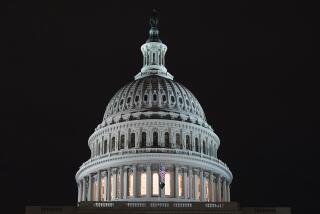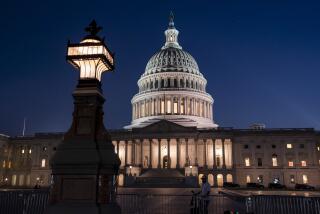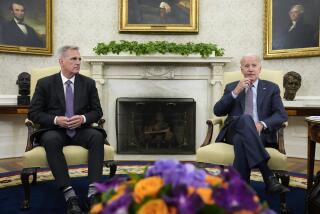Conferees Ratify Key Elements of Farm Bill
- Share via
WASHINGTON — Senate and House conferees, pressing to deliver a huge farm bill before Congress begins its holiday recess, formally ratified key elements of a crop subsidy agreement Thursday but moved slowly on a host of remaining issues.
Senate Majority Leader Bob Dole (R-Kan.) threatened to hold up action on a stopgap funding bill until Congress passed the farm measure, which a Senate clerk said was the most voluminous ever considered by Congress.
But Sen. David L. Boren (D-Okla.) countered with a threat to block passage of the farm legislation before Congress goes home.
Drop in Farm Income
“It would be far better to pass a good farm bill in January or February than to pass a bad farm bill now,” said Boren, who calculated that the pending measure might drop farm income by 6% next year.
Despite Boren’s complaints, a veteran House Agriculture Committee aide estimated in an interview that the bill’s crop subsidy provisions would raise current spending levels by 20% to 40% over the next five years. Spending in the next year alone should increase to $25 billion from the current $20 billion, said the aide, Eugene Moos.
“There’s not much else you can do without throwing a lot of farmers to the dogs,” Moos said.
The agreement on crop subsidies involved freezing so-called “target prices” for grain, cotton and rice for two years, then spreading a 10% cut over the next three years in 2%, 3% and 5% increments. Farmers receive direct subsidies from the government if the cash price they receive for their crops falls below the target price.
Cut in Guaranteed Prices
At the same time, the legislation would lower the guaranteed minimum prices at which the government buys up crops if market prices are lower. The idea behind lowering the “price support” levels is to make U.S. crops more competitive in world markets and to save the government from having to buy up billions of dollars’ worth of surplus crops.
But the combination of freezing the target prices, while lowering price supports, will increase direct subsidies, which are based on the difference between the two.
Dole said the agreement boosted the bill’s crop subsidy costs to an estimated $55.5 billion for the next three years. Reagan has warned that he may veto the bill if it costs much more than $50 billion, which is $15 billion more than the budget target adopted by Congress last August, before reports of bumper crops were issued.
Dole said he believes that Reagan could accept the agreement because “it starts making the policy changes he wants in the third year. We do in five years what he would have done in four years.”
Grudging Acceptance
It represented a compromise that pleased most farm-state lawmakers and won grudging acceptance from Agriculture Secretary John R. Block.
The Administration had insisted on only a one-year freeze in target prices, followed by a 15% cut over three years. Many farm-state members of Congress had sought a three- to five-year freeze.
The lawmakers argued that subsidies should not be cut when thousands of debt-ridden farmers are struggling to survive the worst economic stress in rural America in five decades.
“It’s all right,” Sen. John Melcher (D-Mont.) said of the crop subsidy compromise. “It’s the equivalent of a three-year target price freeze.”
But Senate Agriculture Committee Chairman Jesse Helms (R-N.C.), who wanted the one-year freeze sought by the Administration, said: “I’m not dancing with joy.”
Sticky Issues Remain
The conferees still faced a number of sticky issues, including dairy price supports and the amount of acreage that grain, cotton and rice farmers would have to idle to stem a burgeoning buildup of government-purchased surpluses.
Moos said Congress is under unprecedented pressure this year to keep the subsidies flowing. “The members are under tremendous pressure not only from the lobbyists,” who packed the hallway outside the conferees’ meeting room, “but also from people calling up from out in the country,” he said.
More to Read
Get the L.A. Times Politics newsletter
Deeply reported insights into legislation, politics and policy from Sacramento, Washington and beyond. In your inbox twice per week.
You may occasionally receive promotional content from the Los Angeles Times.










